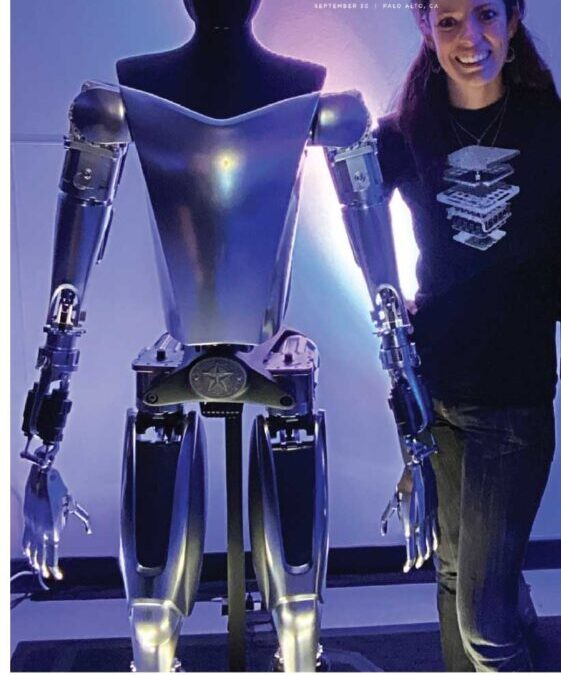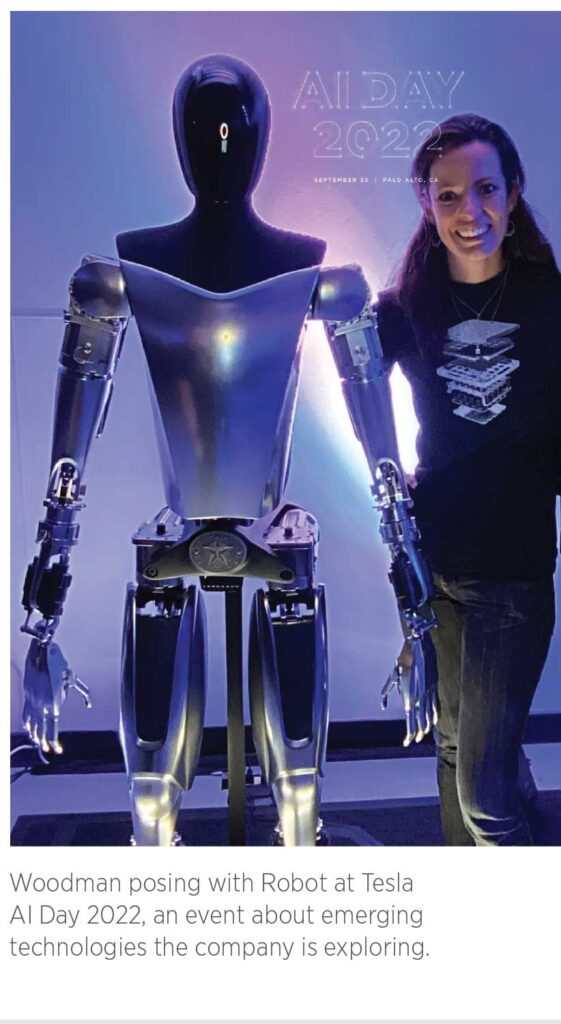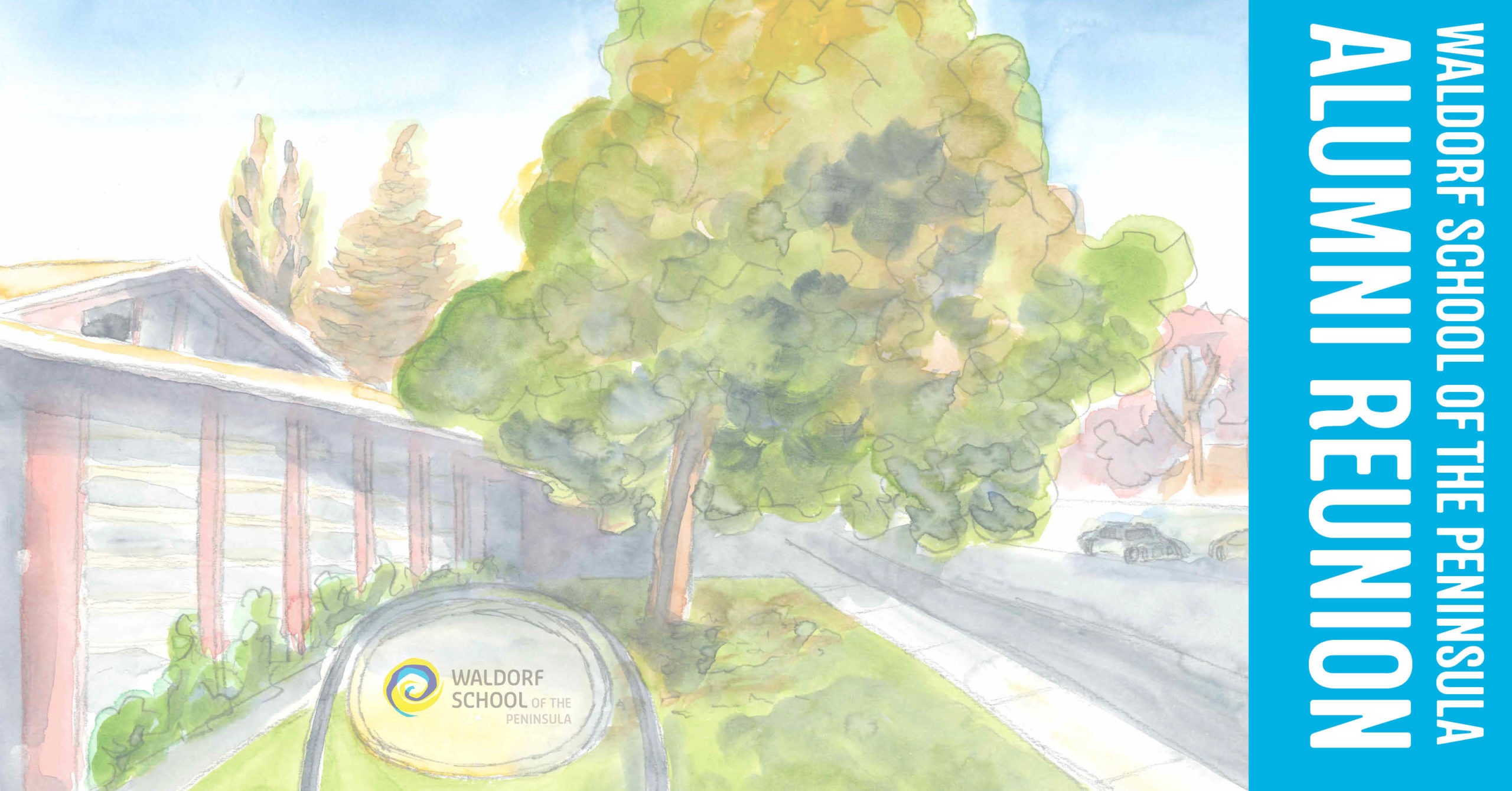
Alum Alyssa Woodman: Forging a Path at Tesla in Cars and AI
Interview by Nita June for School Renewal Magazine
Reprinted with permission.
Born in Germany, Woodman grew up in the Bay Area, and attended Waldorf School of the Peninsula (WSP) in Mountain View, California, from kindergarten through Grade 8. For high school, she spent one year
at a German international school and the last three at San Francisco Waldorf High School, commuting to the city every day for three-plus hours because she loved Waldorf so much. Woodman attended Drexel University in Philadelphia for a BS in Design and Merchandising and then worked at a software start up, working up to project manager in two years.
She then joined Tesla as a project manager in low voltage harness engineering. Nine years later, Woodman has worked her way through various departments (vehicle engineering, sales operations, new markets, engineering finance) to find her way back to engineering, this time on the Dojo project leading a team of PMs in building a supercomputer to accelerate autopilot AI training. She joined the board of WSP several years ago, which she says, “has given her a huge appreciation for the
infinite work from faculty and staff to make the Waldorf magic happen!”
How did the Waldorf teaching approach support the development of your analytical mind? Instead of being given text books that held facts to learn by rote, we dove into topics from source material and first
principles. Physics, chemistry, and biology main lessons always started with an experiment, observing and measuring the results, posing hypotheses and testing those again until we could confirm or deny our assumptions. History and humanities started with a question, or a story, or belief system that was researched, discussed, reflected on in the context of the time and culture. Learning in this investigative way keeps you curious and perceptive, open to new ideas and willing to challenge given assumptions.
“Engineering is ultimately a
creative, problem-solving,
and collaborative pursuit that
very much reminds me of my
time at [Waldorf].”
How did the study of arts, movement and music impact your journey? I can’t say that I was very musically gifted (my parents may remember a particularly embarrassing flute solo presentation freshman year in high school), but I very much enjoyed painting, knitting, sculpture, weaving, basketry, stained glass and many other visual/practical arts. On the one hand, just the joy and freedom of creating something from a blank piece of paper or a set of raw materials, bringing your ideas and imagination to life, getting your hands dirty and having direct and immediate impact on the materials. But also practically working through a design concept, hitting snags or mistakes along the way, adjusting or adapting your methods, or simply learning to accept a different outcome than the one you originally imagined; these are all lessons that artistic pursuits slowly teach us one painting or knitted sock at a time. I have adjusted my personal path many times, and I consider flexibility and adaptability one of my greatest assets. I have little doubt that artistic endeavors are a key to developing those skills.
How did the well-rounded, liberal arts focus of a Waldorf school shape your decision to work in the field of science/tech? Honestly, I still don’t know what I “want to be when I grow up!” But along the way, I did learn that I enjoy “real work”—designing things, building things, fixing things—and so my gradual transition from design arts, through various roles, back to engineering was less of a single decision and more of a journey through trial and error to find a role that keeps me engaged, challenged, and constantly learning.
Engineering is ultimately a creative, problem-solving, and collaborative pursuit that very much reminds me of my time at school. Part of my struggle as a Waldorf graduate was that I felt I could go in so many directions, it was hard for me to choose a major for college, and tough to choose where to look for my first job. I have always been a tad envious of people who know exactly what they want to do, and can map a path forward based on those goals. I have had to embrace my ‘jack of all trades’ tendencies, and make choices and course corrections as they arise. The exciting thing is I still feel like I could go in many different directions with my life and career, and am looking forward to the next adventure when it finds me!
How would you describe rigor in a Waldorf school? Subtle. I never felt pressured to do more or be better, but the environment brings out the best in you. Teachers who are passionate about their subjects, fellow students whose skills and abilities inspire your own growth and development, and a climate that encourages exploration while supporting failure. I don’t think I missed a single day of high school, and walking through the hallways of the WSP high school now makes me want to go back!

